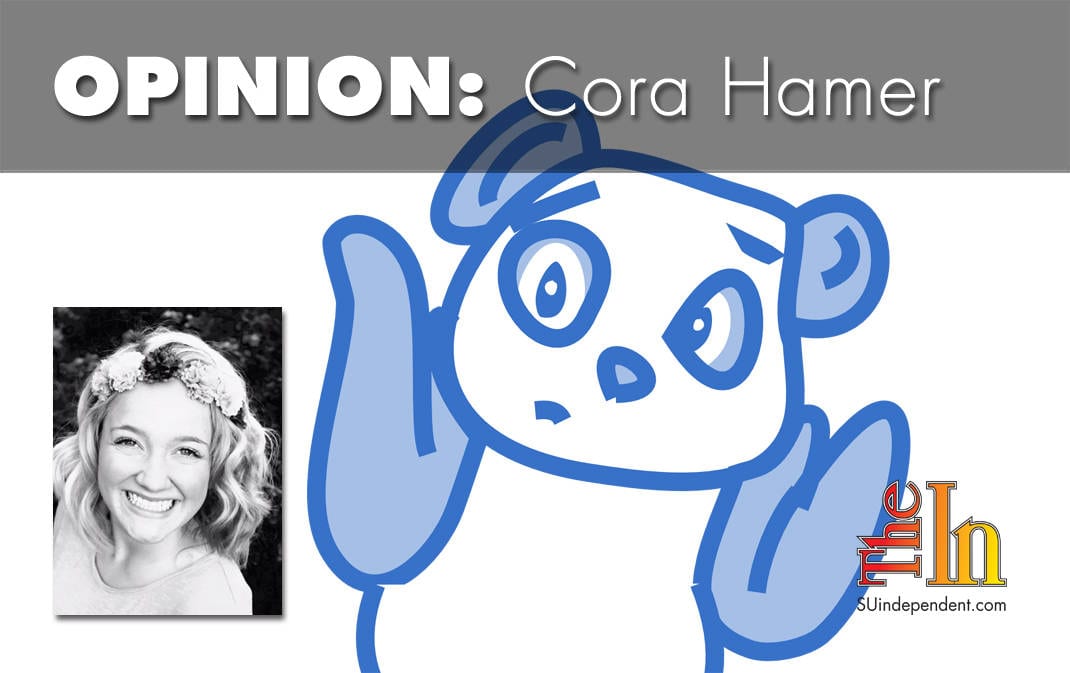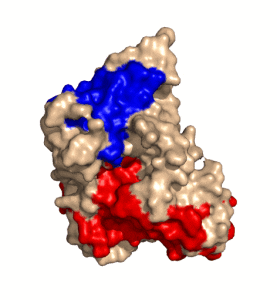 The rickety blue door opened at the meat packing plant, and a large, angry-looking man came out wearing a sly smile, looking as if he’d stepped off the set of a horror film. There was one last cow to be processed that day.
The rickety blue door opened at the meat packing plant, and a large, angry-looking man came out wearing a sly smile, looking as if he’d stepped off the set of a horror film. There was one last cow to be processed that day.
“Come on, cow, let’s go,” the impatient man said. The animal’s eyes widened in fear, his back hooves pressed against the gate. The smell of death immediately filled the cow’s nostrils. The man quickly used a stun gun but missed the essential spot on the cow’s head. The cow’s eyes, supposed to be closed, were large with pain, yet he couldn’t fight. The man carried on, shackling one of his back leg’s to a conveyer belt, leaving the creature to hang upside down.
 As the belt moved to the next station, the cow exerted heavy moans, his bones breaking from too much weight. A different man waiting with a long butcher knife greeted him at the next station. “Last, but not least,” the man said grimly. He held the cow steady as he sliced through the neck cutting out the carotid arteries. Blood gushed as the butcher kept carving. After a minute of blood loss, the widened eyes finally came to a close as his body could take no more.
As the belt moved to the next station, the cow exerted heavy moans, his bones breaking from too much weight. A different man waiting with a long butcher knife greeted him at the next station. “Last, but not least,” the man said grimly. He held the cow steady as he sliced through the neck cutting out the carotid arteries. Blood gushed as the butcher kept carving. After a minute of blood loss, the widened eyes finally came to a close as his body could take no more.
This scenario happens everyday in this country: creatures being tortured before they die. After learning the horrors of it all, I can’t imagine going back to a meat-and-dairy lifestyle. But eating ethically, I’ve learned, puzzles a lot of people. As a result, I’ve frequently found myself fielding questions about why and how people like me choose to go meat-and-dairy-free.
“So why are you vegan?” my friends would ask me over lunch as they chomped down on their deluxe cheeseburgers. “Do you think you are fat or something? Because you know you’re tiny right?” And I, enjoying my delicious veggie burger, responded with a chuckle, “No, I don’t think I am fat; I am just an animal lover. It’s my way of standing up for them.”
Like I said, being vegan means getting asked a lot of questions, some I didn’t know the answer to until I asked fellow vegans or did the research myself. So if you are newly vegan or are curious about ethically sound eating practices, I’ve listed below some of the types of questions you can expect from curious friends, family members, and strangers.
Um, why veganism?
There are a few different reasons why veganism is appealing to many. Ethics may be the most common reason, and it’s my primary reason as well. After watching various documentary videos, some simply just can’t partake of the products yielded by the meat and dairy industry anymore. Some, on the other hand, go vegan for the environment. Livestock plays a huge part in pollution while using an immense amount of resources. A single dairy cow produces about 120 pounds of wet manure per day, which is equal to the waste of 20–40 people. This means that California’s 1.4 million dairy cows produce as much waste as 28–56 million people. Other people go vegan just for the dietary benefits thanks to nutritious, plant-based food choices.
 How are you getting enough protein?
How are you getting enough protein?
Do some research and see if you can find one instance of protein deficiency in American history that wasn’t simply starvation. You actually don’t need nearly as much protein as you think. Animal proteins are very acidic, and the body tends to leech calcium away from the bones in order to compensate, leading to osteoporosis over time. And a diet that is too high in protein is generally hard on the kidneys. Plus, it’s not like all of that extra protein magically turns into muscle or something; all those calories get stored as fat.
A standard American diet consists of about 15 percent protein. A diet that is strictly 100 percent plant-based is very healthy, and you end up getting all your protein needs that way. You can also get protein from vegetables, fruits, nuts, beans, seeds, and grains. Frankly, all organic matter contains protein — another reason why veganism makes sense — so as long as you are consuming a variety of foods, your body will get plenty of all the amino acids it needs to build cells and stay healthy. Vegan protein powder also exists if one isn’t convinced to the fullest.
Do you eat eggs or fish?
This question seems to be asked quite a lot. The answer is no, no eggs or fish. Eggs are still a byproduct of animals, and hens are immediately sent to be slaughtered when their bodies can’t produce another egg. This typically only takes a year or two with the horrendous conditions they are forced to live in. Plus, all male chicks are thrown into the trash — alive — or they are thrown into a grinder — alive — and fed back to farm animals. Also, fish are part of the animal kingdom, and many vegans (and nonvegans, for that matter) disagree with many methods used to catch and kill them.
What do you even eat? Salad?
A lot of people think that a vegan diet must be boring if there is no dairy or meat in it. Others fear their favorite food will be taken away or that they just cannot live without meat. However, this is far from the truth! Although it varies from person to person, a vegan diet can include bean burritos, Chinese stir-fry, tofu curry, potatoes, soups, pasta, salad, beans and rice, vegan sandwiches and wraps, the list goes on. And on. And on. And on. Some stores also sell vegan dairy products like cream cheese, cheese, sour cream, butter, yogurt, ice cream, and cookie dough! Also, for the meat lovers, one can buy tasty vegan burgers, hot dogs, sausage, steak, and — yes — even vegan bacon to satisfy those cravings.
Is it hard to eat out?
Almost all restaurants will have something a vegan can order. Many carry an allergy menu that shows what items are and are not dairy-free. However, I usually scan the menu and see what I can find before asking. Some may find it embarrassing to be the person who asks a variety of questions before making a decision to order, but I think one gets used to it with practice. I don’t mind asking if certain foods have dairy products, because for me, I am standing up against animal exploitation. Whether the waiter knows that or not, I do, and it makes me feel proud.
So whether you’re vegan, want to become vegan, or feel that no way in a million years would you give up meat or dairy, do some research and see what is going into your body. Then, when you eat a meat or dairy product, think about how that item came to be wrapped up neatly inside an “I’m lovin’ it” bag. The answer might surprise you.
For more information on veganism, visit vegan.com.
For more information on the meat and dairy industries, watch “Earthlings” or “Food Inc.“




Amen! Preach, sister!
YES! We desperately need more vegans in the St. George animal community. Good for you, Cora! Much love to you <3
Thank you for the warm welcome Samm!!